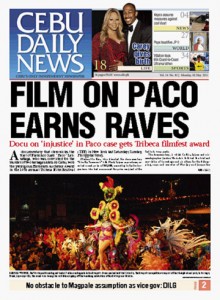Docu on ‘injustice’ in Paco case gets Tribeca filmfest award

Michael Collins, who directed the documentary “Give Up Tomorrow” with Marty Syjuco as producer, received a cash prize of $25,000, according to festival organizers who had announced the prize recipient at the festival’s wrap party.
The documentary, in which Collins, Syjuco and cinematographer Joshua Weinstein followed the trial and conviction of Larrañaga and six others for the kidnapping, rape and murder of Marijoy and Jacqueline Chiong, earlier received a Special Jury Mention prize in the World Documentary Competition at the festival.
In Cebu, Thelma Chiong, Marijoy and Jacqueline’s mother, voiced dismay after learning that the film won the Heineken Audience Award.
Chiong told Cebu Daily News that the film was meant to prove that Franciso Larrañaga was a victim of injustice.
“Why did they give value to that film? He (Larrañaga) was already convicted. He was given a fair trial,” she said.
Although she hasn’t seen the film, Chiong heard that it was produced by Larrañaga’s camp. “This is an issue that never ends,” Chiong said.
Syjuco, who developed the documentary with Collins, is Larrañaga’s brother-in-law.
“Give Up Tomorrow” marks his and Collins’ debut as producers of a full-length documentary feature.
The film festival organizers said in the announcement that the “film played to rapturous response and standing ovations” during its screenings throughout the festival.
‘Miscarriage of justice’
Article continues after this advertisementAudiences at the festival, which began on April 20, voted for the Heineken Audience Award by completing nomination ballots upon exiting screenings of TFF films.
“Give Up Tomorrow” topped all films in the festival’s competition categories, World Narrative, World Documentary, Viewpoints, Spotlight and Cinemania.
The trial of Paco Larrañaga and six others is one of the highest-profile and most controversial in recent Philippine history.
The Larrañaga family and friends maintain the innocence of Paco, whom they claim was in Manila when the crime happened.
He is serving a double-life term in San Sebastian, Spain, on account of a prisoners exchange treaty between Spain and the Philippines.
Larrañaga, a dual citizen of the two countries, was 19 years old at the time of his arrest.
He was previously held at the New Bilibid Prisons in Muntinlupa City. Ronnie Scheib, a film critic of Variety, praised the film in his review.
He said the film “chronicles the case of a young man wrongly convicted of rape and murder, exposing a major miscarriage of justice (with Amnesty International, Fair Trials International and the U.N. Human Rights Commission unanimously concurring).”
He said the documentary “depicts a perfect storm of cronyism, tabloid journalism, public prejudice and corruption that could have happened anywhere.”
Murder mystery, expose
Schieb said the documentary “aroused outrage and disbelief in equal measure” in “concrete, linear and compelling fashion.”
Nancy Schafer, executive director of the festival founded by Robert de Niro, Jane Rosenthal and Craig Hatkoff, said in a statement that “from the first standing ovation of ‘Give Up Tomorrow’ at its premiere at the festival, it was clear that audiences were passionate about the portrayal of Paco Larrañaga’s unjust incarceration.”
Collins told the Philippine Daily Inquirer via e-mail that they never expected to win two awards in the festival.
Vincent Nebrida, a Filipino screenwriter-producer based in New York who saw “Give Up Tomorrow,” told the Inquirer, “The film is a powerfully compelling documentary that successfully manages to be a forensics mystery, family drama, legal thriller and socio-political commentary all at once.
“It’s a world-class cinematic achievement. Yoko Ono saw the docu and called it ‘a must see’ in her blog, imaginepeace.com,” he said.
In an earlier interview with the Philippine Daily Inquirer, Syjuco described the documentary as a “murder-mystery and an exposé of endemic corruption in post-Marcos Philippines.”
‘Small-town feel’
The documentary, six years in the making, was shot in Cebu, Manila, San Francisco, Los Angeles, New York, London, Barcelona, Madrid and San Sebastian.
Ramona Diaz, who directed “Imelda,” the award-winning documentary on former First Lady Imelda Marcos, is the executive producer of “Give Up Tomorrow.”
Collins said he did much research as possible, including a letter by the “The Unheard 35” or Paco’s witnesses who were with him in Manila. Most of them were never allowed to testify,” he said.
In filming the documentary in Cebu, Collins claimed that they ran into people who warned him that what he was doing was “dangerous.”
“Here I was, this foreign guy with a camera, trying to be inconspicuous. This was especially hard in Cebu, which has a small-town feel,” he said.
Aside from logistics, Syjuco recounted that their research proved difficult since they had to deal with the prevailing perception that Paco was guilty.
Collins understood that the film might reignite controversy and bring up painful memories for both families involved in the case.
“There are so many victims in this case, and our goal is not to heal individual wounds, but to tell the truth,” he said.
Syjuco said he was aware that his relation to Larrañaga might throw doubts on the documentary’s integrity.
“I know people will question my objectivity, my brother Jaime is married to Paco’s sister Mimi. But our relationship gave me inside access and perspective. My own mother saw Paco in Manila while the crime (happened in) Cebu. She was not allowed to testify,” he said. /Inquirer with a story from Reporter Ador Vincent Mayol